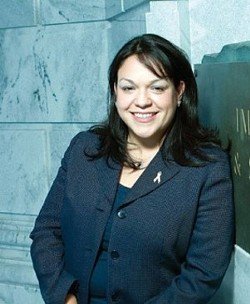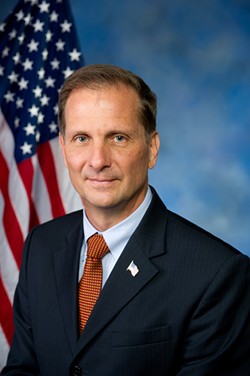Support the Free Press | Facts matter. Truth matters. Journalism matters
Salt Lake City Weekly has been Utah's source of independent news and in-depth journalism since 1984. Donate today to ensure the legacy continues.
Thursday, September 25, 2014
Robles and Stewart Politely Spar Over Immigration, Common Core, ISIL and Same Sex Marriage
Posted By Eric S. Peterson on September 25, 2014, 9:15 PM
The topics were heavy and serious at the 2nd Congressional District debate between Republican incumbent Chris Stewart and his Democratic challenger, Luz Robles, on Sept. 25. The two debated everything from immigration reform and the nation's crippling debt to air strikes in the middle east. But as heavy as the issues were, the two candidates kept the kid gloves on when it came to challenging each other's credentials for the congressional seat.
The only sort-of rhetorical jab thrown in the debate was a challenge Robles made about gridlock in Congress in general, arguing that Congress should consider not taking breaks when critical issues face the nation and that they should consider cutting their own salaries if they're serious about setting an example when it comes to the national debt.
Such things she said might motivate them “to do their job—for a change.”
But beyond that, the two candidates stuck to policy and ideology in making their pitches to voters of the geographically long and diverse 2nd District, which runs from Davis County in the north to St. George in the south of the state.
The debate essentially could have been called a tie as far as issues and arguments, with the two candidates actually agreeing on a fair number of points. If there was any tie-breaking factor between the two, it would probably have gone to Robles, who not only stood and debated for a solid hour while very pregnant, but also did so in heels.
While a difference in ideology was evident, the candidates didn't differ strongly on certain controversial points, like the federal Common Core education standard.
Robles referred to her years in the Utah Legislature as a state senator for Salt Lake City to point out that Common Core still offers local control and pointed out that people forget the standard originated with the National Governors Association and the National School Superintendent's Association.
“They were the ones that decided to bring some standards to the table,” Robles said. “And I use the word 'standard,' not curriculum.”
Stewart was wary of the program but also said it was too soon to tell if it was working. He emphasized the need for local control as a principle predating even the founding of the nation.
“We have this tradition in America—it really started in Jamestown—that goes back to 1609, where we said every community, every town and every village will educate their children—and I think that is exactly right,” Stewart said.
The two also addressed the recent air strikes in Syria and Iraq targeting the Islamic State of Iraq and Levant, or ISIL, that has been waging a genocidal conflict in the Middle East to establish what Stewart dubbed a “terroristic caliphate.”
Again, both Robles and Stewart essentially agreed with the actions currently being taken by the president and Congress to conduct air strikes in the region.
Stewart, citing his 14 years of service in the U.S. Air Force, applauded the strikes, telling the audience “I know the power of air power.” He did say that the United States should focus air strikes on the oil fields of countries funding ISIL, stating that the group was gaining $3 billion in revenue a year to wage its brutal war.
Robles agreed but also said she would urge caution to make sure the United States doesn't once again enter a protracted conflict that would “strain the military and the budget.”
The differences were more distinct on other hot-button issues like same-sex marriage. Robles said same-sex marriage was a matter for the courts to decide, but did say that she was a supporter of equality for all Utahns.
While Stewart said the same-sex marriage cases sought to drastically alter an ancient tradition, Robles referred to the 1968 Civil Rights Act as a modern example of the nation protecting the rights of the country's minorities.
“It's not new in our history to protect individuals' rights,” Robles said. Stewart countered that while all people are “children of the same God,” it was against his moral teaching to believe that marriage could be anything but between a man and a woman.
The two also clashed on immigration. Stewart heralded the United States as a nation built by immigrants, but classified the immigration of centuries past as having been done in “an environment of legality,” saying that the nation now has to make securing the border its top priority.
Robles countered that securing the borders was “critical” but said the country also has to acknowledge the 11 million undocumented immigrants living in the country, immigrants who have children who are U.S. Citizens, work jobs and contribute to society.
“They are a part of our community,” Robles said.
Stewart responded that Congress doesn't need to address every aspect of immigration law at once and that it can be done in piecemeal fashion—but only after securing the border.
On renewable energy, the two candidates agreed that new cleaner energy could help homeland security by making the nation less dependent on foreign sources of oil and gas. Stewart, however, challenged that the nation needs to take advantage of all energy sources, especially while renewables are still untested, and praised fracking for helping to develop new domestic fossil-fuel resources and keeping the price of the commodity low.
“Think of where we would be without fracking,” Stewart said in a soundbite destined to outrage environmental activists.
When it came to the economy and addressing the national debt, Robles cited her experience as a vice president of Zion's Bank working with small businesses to say that there was a problem with “wealth distribution” in the tax code.
“I work with small businesses every day, and I think its critical we bring fairness to the taxation process,” Robles said.
Stewart, however, said that as daunting as the debt is, the answer is as simple as keeping the government out of the way of letting the economy grow.
“Early in January, the deficit was projected to be $850 billion but as the economy grew—even just a few percentage points—then that projection went from $850 to about $550 billion,” Stewart said. “We didn't have any tax increases, we didn't have any other meaningful changes in monetary or fiscal policy out of Washington, D.C. We simply grew the economy.”
While the candidates were comfortable addressing matters of policy and ideology, the debate did stall in an awkward moment when the candidates were asked to direct a question to each other of their choosing.
Stewart simply asked if Robles knew if her baby was a boy or a girl—Robles answered that it's a girl.
Robles in turn asked Stewart to explain what he thought in general the role of the federal government was. He didn't answer the question, and the moderator moved on after Robles asked.
But it was at least clear what Stewart thought of the federal government when it comes to public land in Utah.
“I could show you bureaucrats in Washington, D.C., making decisions about Utah, that have never set foot in our state,” Stewart said.
Robles, however, called the management a “shared responsibility” and criticized the “us versus them” rhetoric of the public-lands dispute.
But like the rest of the debate, even the criticism of public-lands tough talk was civil and not “her” versus “him.”
For more info about the candidates' upcoming events, visit RoblesForCongress.com and ChrisStewartForCongress.com
The only sort-of rhetorical jab thrown in the debate was a challenge Robles made about gridlock in Congress in general, arguing that Congress should consider not taking breaks when critical issues face the nation and that they should consider cutting their own salaries if they're serious about setting an example when it comes to the national debt.
Such things she said might motivate them “to do their job—for a change.”
But beyond that, the two candidates stuck to policy and ideology in making their pitches to voters of the geographically long and diverse 2nd District, which runs from Davis County in the north to St. George in the south of the state.
The debate essentially could have been called a tie as far as issues and arguments, with the two candidates actually agreeing on a fair number of points. If there was any tie-breaking factor between the two, it would probably have gone to Robles, who not only stood and debated for a solid hour while very pregnant, but also did so in heels.
While a difference in ideology was evident, the candidates didn't differ strongly on certain controversial points, like the federal Common Core education standard.
Robles referred to her years in the Utah Legislature as a state senator for Salt Lake City to point out that Common Core still offers local control and pointed out that people forget the standard originated with the National Governors Association and the National School Superintendent's Association.
“They were the ones that decided to bring some standards to the table,” Robles said. “And I use the word 'standard,' not curriculum.”
Stewart was wary of the program but also said it was too soon to tell if it was working. He emphasized the need for local control as a principle predating even the founding of the nation.
“We have this tradition in America—it really started in Jamestown—that goes back to 1609, where we said every community, every town and every village will educate their children—and I think that is exactly right,” Stewart said.
The two also addressed the recent air strikes in Syria and Iraq targeting the Islamic State of Iraq and Levant, or ISIL, that has been waging a genocidal conflict in the Middle East to establish what Stewart dubbed a “terroristic caliphate.”
Again, both Robles and Stewart essentially agreed with the actions currently being taken by the president and Congress to conduct air strikes in the region.
Stewart, citing his 14 years of service in the U.S. Air Force, applauded the strikes, telling the audience “I know the power of air power.” He did say that the United States should focus air strikes on the oil fields of countries funding ISIL, stating that the group was gaining $3 billion in revenue a year to wage its brutal war.
Robles agreed but also said she would urge caution to make sure the United States doesn't once again enter a protracted conflict that would “strain the military and the budget.”
The differences were more distinct on other hot-button issues like same-sex marriage. Robles said same-sex marriage was a matter for the courts to decide, but did say that she was a supporter of equality for all Utahns.
While Stewart said the same-sex marriage cases sought to drastically alter an ancient tradition, Robles referred to the 1968 Civil Rights Act as a modern example of the nation protecting the rights of the country's minorities.
“It's not new in our history to protect individuals' rights,” Robles said. Stewart countered that while all people are “children of the same God,” it was against his moral teaching to believe that marriage could be anything but between a man and a woman.
The two also clashed on immigration. Stewart heralded the United States as a nation built by immigrants, but classified the immigration of centuries past as having been done in “an environment of legality,” saying that the nation now has to make securing the border its top priority.
Robles countered that securing the borders was “critical” but said the country also has to acknowledge the 11 million undocumented immigrants living in the country, immigrants who have children who are U.S. Citizens, work jobs and contribute to society.
“They are a part of our community,” Robles said.
Stewart responded that Congress doesn't need to address every aspect of immigration law at once and that it can be done in piecemeal fashion—but only after securing the border.
On renewable energy, the two candidates agreed that new cleaner energy could help homeland security by making the nation less dependent on foreign sources of oil and gas. Stewart, however, challenged that the nation needs to take advantage of all energy sources, especially while renewables are still untested, and praised fracking for helping to develop new domestic fossil-fuel resources and keeping the price of the commodity low.
“Think of where we would be without fracking,” Stewart said in a soundbite destined to outrage environmental activists.
When it came to the economy and addressing the national debt, Robles cited her experience as a vice president of Zion's Bank working with small businesses to say that there was a problem with “wealth distribution” in the tax code.
“I work with small businesses every day, and I think its critical we bring fairness to the taxation process,” Robles said.
Stewart, however, said that as daunting as the debt is, the answer is as simple as keeping the government out of the way of letting the economy grow.
“Early in January, the deficit was projected to be $850 billion but as the economy grew—even just a few percentage points—then that projection went from $850 to about $550 billion,” Stewart said. “We didn't have any tax increases, we didn't have any other meaningful changes in monetary or fiscal policy out of Washington, D.C. We simply grew the economy.”
While the candidates were comfortable addressing matters of policy and ideology, the debate did stall in an awkward moment when the candidates were asked to direct a question to each other of their choosing.
Stewart simply asked if Robles knew if her baby was a boy or a girl—Robles answered that it's a girl.
Robles in turn asked Stewart to explain what he thought in general the role of the federal government was. He didn't answer the question, and the moderator moved on after Robles asked.
But it was at least clear what Stewart thought of the federal government when it comes to public land in Utah.
“I could show you bureaucrats in Washington, D.C., making decisions about Utah, that have never set foot in our state,” Stewart said.
Robles, however, called the management a “shared responsibility” and criticized the “us versus them” rhetoric of the public-lands dispute.
But like the rest of the debate, even the criticism of public-lands tough talk was civil and not “her” versus “him.”
For more info about the candidates' upcoming events, visit RoblesForCongress.com and ChrisStewartForCongress.com
More by Eric S. Peterson
-
The Secret Sauce
How Utah lawmakers disclose—or don't disclose—conflicts of interest.
- Feb 14, 2024
-
Police departments in Salt Lake County spent almost $20 million on civil rights complaints in the past decade
The Co$t of Mi$conduct
- Oct 18, 2023
-
Women decry harassment and toxic culture at St. George auto dealership
Men at Work
- Oct 11, 2023
- More »







